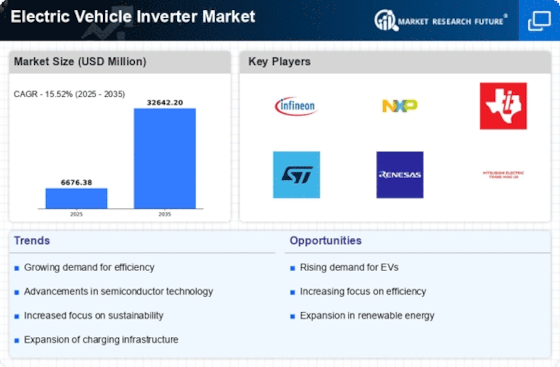Top Industry Leaders in the Electric Vehicle Inverter Market

The Competitive Landscape of the Electric Vehicle Inverter Market
In the electrifying symphony of modern transportation, where electrons dance to propel vehicles forward, the electric vehicle (EV) inverter acts as the unseen conductor, orchestrating power flow and transforming static energy into dynamic motion. This dynamic market hums with innovation, fierce competition, and the promise of powering a zero-emission future. Navigating this complex space requires discerning the strategies of key players, understanding market share nuances, and recognizing the emerging trends shaping its future rhythm.
Key Players:
- Continental
- Vitesco Technologies
- Toyota Industries Corporation
- Valeo Group
- Lear Corporation
- Changsha BYD
- Hitachi Astemo Ltd
- Robert Bosch GmbH
- Marelli Corporation
- Mitsubishi Electric Corporation
- Nissan, DENSO Corporation
- CWB Automotive Electronics Co.Ltd.
- Sungchang Autotech Co., Ltd.
Strategies Adopted by Leaders:
- Technological Prowess: Siemens and ABB lead the charge with expertise in high-efficiency silicon carbide (SiC) inverter technology, advanced cooling systems, and software algorithms for optimal motor control, catering to premium and high-performance EVs.
- Vertical Specialization: TECO Electric & Machinery focuses on cost-effective and reliable silicon-based inverters for mass-market EVs, while Continental Automotive targets ruggedized inverters for heavy-duty electric trucks and buses.
- Partnership Play: Denso collaborates with automakers and battery manufacturers, offering integrated powertrain solutions and streamlined system optimization for customers.
- Open-Source Initiatives and Knowledge Sharing: The International Electric Vehicle Technology Council (IEVTC) promotes standardized communication protocols and best practices in inverter design, benefiting the entire industry.
- Focus on Compactness and Efficiency: Developing smaller and lighter inverters with minimal energy losses maximizes cabin space, extends driving range, and reduces battery weight.
Factors for Market Share Analysis:
- Performance and Efficiency: Companies offering inverters with high conversion efficiency, minimal heat generation, and fast response times command premium prices and secure market share by optimizing energy consumption and extending driving range.
- Reliability and Durability: Ensuring robust designs, redundant safety features, and compliance with stringent automotive standards builds trust and minimizes downtime for EV owners.
- Scalability and Cost Competitiveness: Balancing advanced features with an attractive price point is crucial for capturing market share, particularly in price-sensitive segments and emerging markets.
- Focus on Software and Control Algorithms: Developing intelligent inverter software for motor control optimization, regenerative braking, and thermal management enhances driving experience and improves battery lifespan.
- Compliance with Environmental Regulations: Utilizing recyclable materials, adhering to energy efficiency standards, and minimizing waste generation caters to growing environmental concerns and opens doors to eco-conscious buyers.
New and Emerging Companies:
- Startups like GaN Systems and Wolfspeed: These innovators focus on developing next-generation inverters based on gallium nitride (GaN) technology, promising even higher efficiency, faster switching speeds, and improved thermal performance.
- Academia and Research Labs: MIT's Energy Initiative and Stanford University's Department of Mechanical Engineering explore next-generation technologies like multi-level inverters, integrated charging systems, and advanced cooling technologies, shaping the future of the market.
- Advanced Material Science Innovations: Companies like Dow Chemical and 3M develop high-performance thermal management materials and lightweight composites, enabling the development of smaller, lighter, and more efficient inverters.
Industry Developments:
Continental:
- October 2023: Unveiled a new high-voltage silicon carbide (SiC)-based inverter with improved efficiency and power density for high-performance EVs.
- August 2023: Partnered with a leading battery manufacturer to develop integrated EV powertrain solutions, including inverters.
Vitesco Technologies:
- October 2023: Acquired a Chinese inverter manufacturer to expand its EV inverter portfolio and global footprint.
- August 2023: Introduced a cost-effective inverter solution for small EVs and urban mobility applications.
Toyota Industries Corporation:
- October 2023: Announced plans to build a new factory dedicated to EV inverter production in Japan.
- August 2023: Showcased its next-generation inverter technology with ultra-fast charging capabilities at a major EV trade show.
